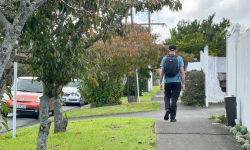
Gareth Jones attends Dunedin City Baptist Church and is Emeritus Professor in Anatomy at the University of Otago. He has written this letter to Christians who have not had the COVID-19 vaccine.
As a fully vaccinated person, I want to treat you as an equal, because we are equal in Godu2019s eyes, and we are members together of the Body of Christ. I am used to living with others where there is disagreement over a theological matter or an ethical question, and I know these disagreements can sometimes be fraught. But there are ways of dealing with them, as we seek to come together in love. But vaccination seems to be different. I donu2019t really understand why this is, except that in a pandemic we could be dangerous to one another. I could infect you and you could infect me, and as a person in an older age group, the dangers for me are far greater than for most of you. This unfortunately has repercussions for how we worship together in a church setting.
We are members of a community who influence each other, both for good and for bad. We cannot avoid affecting, and even infecting, one another. We hear a great deal about the u2018no jab, no jobu2019, mantra, and I have enormous sympathy with the unvaccinated who find themselves in this predicament, but I ask them to consider why this is even being proposed. It is to protect the health of the community, rather than to exercise inordinate control over peopleu2019s lives. I agree it is an extreme measure, but extreme measures are sometimes necessitated by dire situations. And remember these are being instituted in many countries, with very different political philosophies. Nevertheless, I am prepared to admit that some political leaders are taking upon themselves the mantle of protector-in-chief, and we are encountering elements of over-reachu2014albeit, well intentioned over-reach. But this should not distract you from the primary goal of lockdowns and vaccine mandatesu2014protecting the health of the community, and enabling the hospitals to cope and have the resources to care for patients with other illnesses.
Lockdowns are draconian measures, and no democratic government would resort to them under normal circumstances, but these are not normal times. The question that confronts us all is how much we wish to protect human life and respect human dignity. This is generally a no-brainer for Christians; we do our best to show love and compassion to all who are suffering.
It is easy in New Zealand though to underestimate the damage that COVID-19 can cause. Being Welsh I keep up with the COVID trajectory in Wales, with its population of 3 million. The current death toll from COVID is in excess of 6,150; if these figures had been in New Zealand with its larger population there would have been approaching 10,000 deaths.
As with all ethical dilemmas a balance has to be found between the reasons for and against both vaccination and non-vaccination. For the unvaccinated, are the perceived negatives so serious that they justify exposing others to COVID? While vaccination will not completely prevent infection, it will mitigate the worst effects of COVID for both you and others. If you lose your job and your earning capacity, how will you support your family? And is the welfare of your family less important than the principles on which you base your decision not to be vaccinated? What is the most caring path for you to take? Unfortunately, many of the decisions with which we are confronted in life are murky, and involve compromises.
Some of the arguments against vaccination are purportedly scientific ones: COVID can be prevented by drugs like Ivermectin or hydroxychloroquine; the vaccines have not been adequately tested; they are dangerous resulting in death; they are ineffective. Some make these claims, including a small number of doctors and scientists, with the result that members of the public conclude they should refuse vaccination. After all, you may say, if scientists cannot agree, there must be something wrong with the vaccines. But there are always different viewpoints in science, as ideas are challenged and new research is undertaken. No solutions are fool proof, but this is quite different from saying that nothing can be trusted.
There will always be the occasional lone voice, the individual who has concluded that what everyone is happy about is actually toxic. Typically, this lone voice is only too keen to tell the world about this u2018scaryu2019 finding. Individuals like this are frequently depicted as martyrs and as the only individuals prepared to stand up for the truth against the powerful forces of the establishment arrayed against them. We should never dismiss out-of-hand the claims of lone voices. They should be investigated and assessed on the same grounds as all other claims, using peer-reviewed evidence and stringent analyses. But on one point I would be categoricalu2014never rely upon claims (generally originating in the United States) that appear on YouTube videos, Fox News clips, or channels specifically set up to promulgate anti-vaccine stances.
The trouble with so many of these claims is that they give the impression that they are providing the listener or viewer with u2018secret knowledgeu2019 that the elite do not want you to hear or see. Consequently, you are told you should not listen to epidemiologists or virologists, who by definition want to mislead you, and who are being sponsored by pharmaceutical companies, universities or governments. The impression is given that those who are fighting against the dominant viewpoint, vaccination, have seen the light. They are the truthful remnant, but are they? Check on their claims to see whether they are based on verifiable or dubious evidence.
I acknowledge there are problems with the mantra that we are to u2018follow the scienceu2019. This gives the impression that scientists are superior to everyone else, and that what scientists claim is infallible. The reality is that scientists can be wrong and that scientists have followed blind alleys on more than one occasion. Think of the memorials to eugenics currently being dismantled in one university after another. As an anatomist I shudder when I think of the way in which anatomists during the Nazi era in Germany and occupied territories obtained bodies direct from the gas chambers. But these aberrations are no reason to reject the superb achievements that have revolutionised daily life, and ensured that most children live beyond one year of age. Christians should be the first to thank God for the manner in which his creative gifts have been employed to enhance life for one population after another, and science has been core in so many of these achievements. Vaccination against COVID is no different; no vaccine is perfect, and yet the available vaccines (seven are approved for use by WHO) are transforming the social landscape in an increasing range of countries. Scientists should never make claims of invincibility, but neither should they be decried as the handmaidens of powerful forces intent on overthrowing civilized life as we know it.
Freedom of expression and action is regularly touted as a central objection to mandatory vaccination. And yet all of us living in a society have to accept restrictions on some of our actions. Think of all the legal restrictions linked to driving cars in any country. In past pandemics, some populations have had in place mandatory vaccinations against smallpox and polio. These restrictions and many others are aimed at ensuring the common good, without which organized society could not exist with safety for its members. This can only be assured as long there is general respect for those in authority. Once this is lost societal cohesion disappears, a salutary thought for those who vigorously oppose vaccination aimed at controlling a serious health emergency.
But what are the specifically Christian reasons for rejecting vaccinations against COVID? Is it because they are in some way a threat to the Lordship of Christ? It seems to me this could be the only legitimate reason for rejecting them from a Christian angle. Protection against ill health hardly fits into this category, as demonstrated by Christ himself who healed many and provided sustenance to those who came into contact with him. Doing our best to protect others from illness and possibly death is an outworking of love for our neighbour, a basic prerequisite of the Christian faith. What then about Paulu2019s teaching on eating food offered to idols (1 Corinthians 8:1-13)? This was a highly contentious topic for some of the early churches, situated as they were in the midst of societies saturated with idol worship. How were Christians to approach this very practical and divisive issue? For Paul, it was not the act of eating food that was central, but how their action would be seen by fellow believers. Would it strengthen their faith or be a distraction? Similarly with vaccines. What effect will rejection of vaccination have on the faith of other Christians, especially those with whom you normally worship? In a public health crisis, there is an added dimension, namely, what effect will it have on the health of fellow believers and on the character of the Christian community to which you belong? Is the possibility of chronic ill-health, that could be avoided or at the very least ameliorated, justification for pursuing an ideological goal that is not a core Christian belief? No matter what our disagreements we have to demonstrate our love and concern for each other. In a viral pandemic, health concerns are paramount.
I am aware there are other theological grounds that concern some of you, of which the link to past abortions is the best known. This has been thoroughly assessed over many years, and has been taken very seriously. For most, these concerns have been satisfactorily resolved, including by those resolutely opposed to abortion. But you may still argue that God will look after you and protect you from a deadly virus. I have to admit I find this unconvincing since there is no Scriptural teaching along these lines, and the evidence of our eyes shows that it is not true. Many faithful Christians have died from COVID. Then again, some of you may think that your bodies should not be modified by vaccines. But we modify our bodies in all sorts of ways, by what we eat, how much we do or do not exercise, the therapies and drugs we take to ward off infections and cancers. And for those with life-threatening conditions, we gratefully accept major intrusions into our bodies. For Christians, these are evidences of the goodness of God displayed in the creativity and ingenuity of the medical profession. From my perspective, the same can be said of effective vaccines. Thankfulness and gratitude to God by the people of God are a fitting response to vaccines and vaccine mandates, together with an urgent drive to make vaccines as available as possible worldwide.
2 November 2021
Gareth Jones, Department of Anatomy, University of Otago


